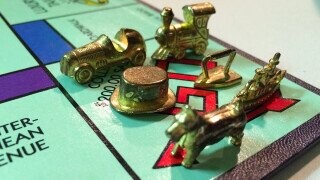Thousands of WWII POWs Escaped Thanks to ... Monopoly?

This probably goes without saying, but being held prisoner by Nazis is no one’s idea of a good time. So, during World War II, the Allied forces did their best to get soldiers out from POW camps – by sneaking in maps, money, and escape tools, via various board games and sports equipment. And everyone’s favorite stolen IP Monopoly was the undisputed heavyweight champion of them all.
You see, the Axis, as horribly horrible and racist and rampantly murdery as they were, still allowed care packages for prisoners of war, and board games specifically were seen as innocent fun – or, more accurately and ironically, the Nazis hoped that if the prisoners were distracted then maybe they wouldn’t try to escape so dang much. Allied soldiers, after all, were instructed to try and make a break for it as early and often as possible, even if it was an obviously failed endeavor, just to waste the time and resources of the Axis.
Don't Miss
Enter British intelligence officer Christopher Clayton “Clutty” Hutton and printer James Waddington, tasked, specifically, with getting compasses, cutting tools, and cash to the POWs.

Singin' in the Rain, MGM
Clutty was hired by England’s MI9, not because of his record, but because of his interest in magicians and escapology – and even more specifically because he once challenged Houdini to escape from a box he and his father personally built. Also, he was a notorious pain in the ass and free spirit who said things like, “Let’s smuggle radio parts into a cribbage board!” (Which, y’know, they did.)
Waddington, meanwhile, was the U.K. licensor of Monopoly and, more importantly, knew how to print things on silk. In fact, he was already printing maps for the Royal Air Force, the silk sewn into the linings of their jackets in case they were downed behind enemy lines. Silk didn’t wear out like paper and made a hell of a lot less noise – both things one would want when breaking out of a POW camp.
The two men created a bunch of fake humanitarian aid organizations – using the addresses of buildings burned down in the Blitz – and got to work. They created an elaborate code system to get messages to POWs, to let them know altered games were on the way. Eventually, they cut out the middle man and just told soldiers what to look for during basic training.
Using designs dreamed up by Clutty, Waddington printed the Monopoly board on one side of the silk and maps for various European countries on the back. They even figured out how to sneak a working compass, saw, and freaking wire cutters into the thin cardboard beneath. Real money was stashed in with all the fake stuff. The prisoners would simply steam the map off the board and, boom, something a whole hell of a lot better than Free Parking.

Mark Stozier, Creative Commons
Case in point: as the war was drawing to a close, word started getting around that the Nazi SS was trying to take control of the POW camps from the German air force in order to – surprise! – murder all of the prisoners. American Lieutenant David Bowling, using tools smuggled in from a Monopoly board, escaped and made his way to Switzerland, where he was able to avert (this particular) disaster.
Reportedly, the Nazis never caught on. They’d stopped some of the other attempts, especially the ones with radio parts, but Monopoly eluded their suspicions until the very end. There were 744 confirmed escapes, but it’s estimated that thousands of British and American soldiers probably avoided certain doom – all thanks to a board game that usually ends with upended coffee tables and you punching your brother.
Eirik Gumeny is the author of the Exponential Apocalypse series, a five-book saga of slacker superheroes, fart jokes, and assorted B-movie monsters, and he recently added werewolves and assassins to The Great Gatsby. He’s also on Twitter a bunch.
Top Image: mpmd2009/Pixabay